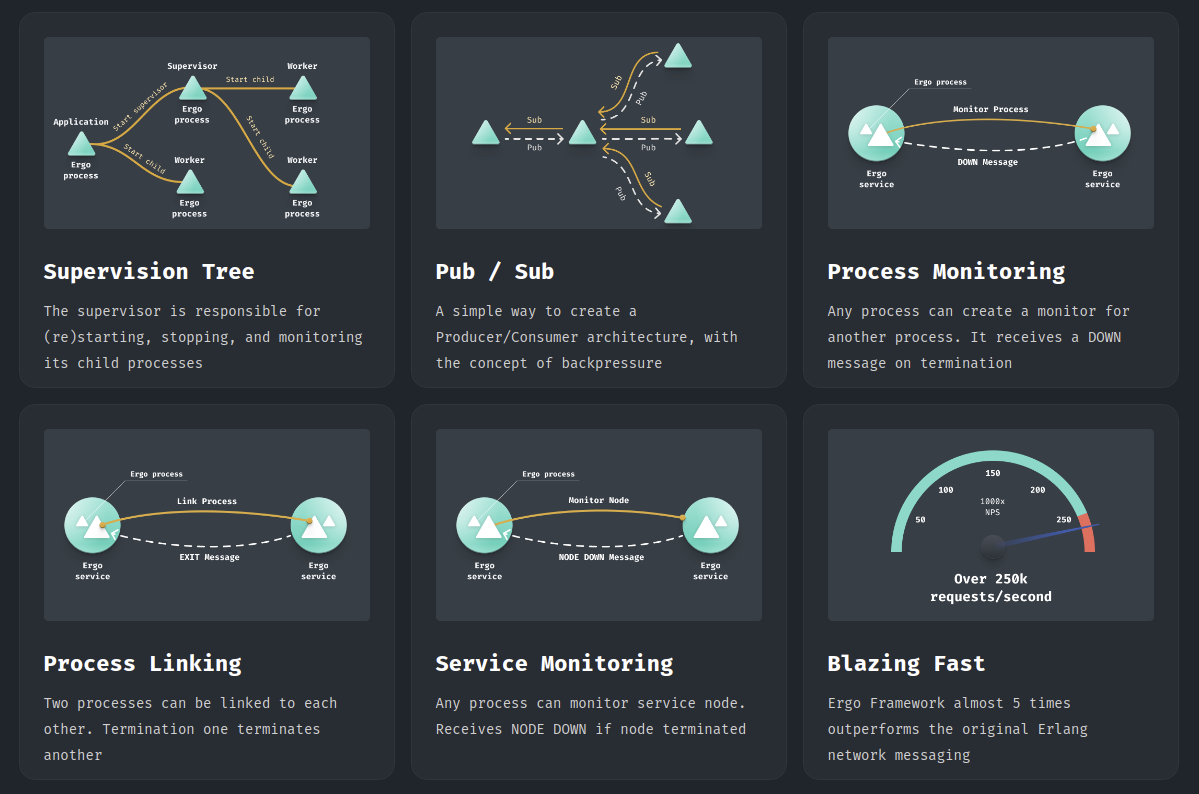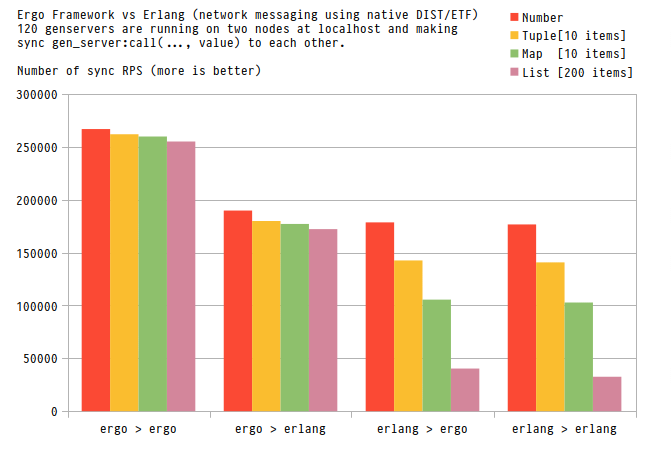Technologies and design patterns of Erlang/OTP have been proven over the years. Now in Golang. Up to x5 times faster than original Erlang/OTP in terms of network messaging. The easiest way to create an OTP-designed application in Golang.
The goal of this project is to leverage Erlang/OTP experience with Golang performance. Ergo Framework implements DIST protocol, ETF data format and OTP design patterns gen.Server, gen.Supervisor, gen.Application which makes you able to create distributed, high performance and reliable microservice solutions having native integration with Erlang infrastructure
Distributed Cloud is coming. With Ergo Framework you can join your services into a single cluster with transparent networking using our Cloud Overlay Network where they can connect to each other smoothly, no matter where they run - AWS, Azure or GCP, or anywhere else. All these connections are secured with end-to-end encryption. Read more in this article https://blog.ergo.services/cloud-overlay-network-3a133d47efe5.
First, you need to install the boilerplate code generation tool ergo - https://github.com/ergo-services/tools using command below
go install ergo.services/tools/ergo@latest
And then, you can create your project with just one command. Here is example:
Supervision tree
mynode
|- myapp
| |
| `- mysup
| |
| `- myactor
|- myweb
`- myactor2
To generate project for this design use the following command:
ergo -init MyNode -with-app MyApp -with-sup MyApp:MySup -with-actor MySup:MyActor -with-web "MyWeb{port:8000,handlers:3}" -with-actor MyActor2
as a result you will get generated project:
mynode/
|-- apps/
| `-- myapp/
| |-- myactor.go
| |-- myapp.go
| `-- mysup.go
|-- cmd/
| |-- myactor2.go
| |-- mynode.go
| |-- myweb.go
| `-- myweb_handler.go
|-- README.md
|-- go.mod
`-- go.sum
to try it:
$ cd mynode
$ go run ./cmd/
You may also read our article about this tool with a great example https://blog.ergo.services/quick-start-1094d56d4e2
- Support Erlang 25 - allows you connect your node to (and accept connection from) any Erlang/Elixir node within a cluster
- Spawn Erlang-like processes
- Register/unregister processes with simple atom
- Set of ready-to-use disign patterns (behaviors)
gen.Serverbehavior with atomic state and Erlang's gen_server support to make sync requestServerProcess.Call, async -ServerProcess.CastorProcess.Sendin fashion ofgen_server:call,gen_server:cast,erlang:sendaccordinglygen.Supervisorbehavior with all known restart strategies (One For One, One For All, Rest For One, Simple One For One)gen.Applicationbehavior with all known starting types (Permanent, Temporary, Transient)gen.Poola basic design pattern with a pool of workers. All messages/requests received by the pool process are forwarded to the workers using the "Round Robin" algorithm. The worker process is automatically restarting on terminationgen.TCP- socket acceptor pool for TCP protocols. This behavior aims to provide everything you need to accept TCP connections and process packets with a small code base and low latency while being easy to use.gen.UDP- acceptor pool for UDP protocols. This behavior provides the same feature set as TCP but for handling UDP packets using pool of handlersgen.Web- Web API Gateway behavior. This behavior allows you to listen HTTP port and handle HTTP-request using pool of workers.gen.Stagebehavior support (originated from Elixir's GenStage). This is abstraction built on top ofgen.Serverto provide a simple way to create a distributed Producer/Consumer architecture, while automatically managing the concept of backpressure. This implementation is fully compatible with Elixir's GenStage. Example is here examples/genstage or just rungo run ./examples/genstageto see it in actiongen.Sagabehavior support. It implements Saga design pattern - a sequence of transactions that updates each service state and publishes the result (or cancels the transaction or triggers the next transaction step).gen.Sagaalso provides a feature of interim results (can be used as transaction progress or as a part of pipeline processing), time deadline (to limit transaction lifespan), two-phase commit (to make distributed transaction atomic). Here is example examples/gensaga.gen.Raftbehavior support. It's improved implementation of Raft consensus algorithm. The key improvement is using quorum under the hood to manage the leader election process and make the Raft cluster more reliable. This implementation supports quorums of 3, 5, 7, 9, or 11 quorum members. Here is an example of this feature examples/genraft
- Monitor processes/nodes, local/remote with Erlang support
- Link processes local/remote with Erlang support
- embedded EPMD (in order to get rid of erlang' dependencies) with Erlang support
- Unmarshalling terms into the struct using
etf.TermIntoStruct,etf.TermProplistIntoStructor to the string usingetf.TermToStringincluding custom marshaling/unmarshaling viaMarshalandUnmarshalinterfaces. But it's highly recommended to useetf.RegisterTypeso you will be receiving messages in a native Golang-type - Encryption (TLS 1.3) support (including autogenerating self-signed certificates)
- Compression support (with customization of compression level and threshold). It can be configured for the node or a particular process.
- Proxy support with end-to-end encryption, includeing compression/fragmentation/linking/monitoring features.
- Tested and confirmed support Windows, Darwin (MacOS), Linux, FreeBSD.
- Zero dependencies. All features are implemented using the standard Golang library.
- Go 1.17.x and above
Golang introduced v2 rule a while ago to solve complicated dependency issues. We found this solution very controversial and there is still a lot of discussion around it. So, we decided to keep the old way for the versioning, but have to use the git tag with v1 as a major version (due to "v2 rule" restrictions). Since now we use git tag pattern 1.999.XYZ where X - major number, Y - minor, Z - patch version.
Here are the changes of latest release. For more details see the ChangeLog
v2.2.4 2023-05-01 [tag version v1.999.224]
This release includes fixes:
- Fixed incorrect handling of
gen.SupervisorStrategyRestartTransientrestart strategy ingen.Supervisor - Fixed missing
ServerBehaviorin [gen.Pool,gen.Raft,gen.Saga,gen.Stage,gen.TCP,gen.UDP,gen.Web] behavior interfaces - Introduced the new tool for boilerplate code generation -
ergohttps://github.com/ergo-services/tools. You may read more information about this tool in our article with a great example https://blog.ergo.services/quick-start-1094d56d4e2
Here is simple EndToEnd test demonstrates performance of messaging subsystem
Hardware: workstation with AMD Ryzen Threadripper 3970X (64) @ 3.700GHz
❯❯❯❯ go test -bench=NodeParallel -run=XXX -benchtime=10s
goos: linux
goarch: amd64
pkg: github.com/ergo-services/ergo/tests
cpu: AMD Ryzen Threadripper 3970X 32-Core Processor
BenchmarkNodeParallel-64 4738918 2532 ns/op
BenchmarkNodeParallelSingleNode-64 100000000 429.8 ns/op
PASS
ok github.com/ergo-services/ergo/tests 29.596s
these numbers show almost 500.000 sync requests per second for the network messaging via localhost and 10.000.000 sync requests per second for the local messaging (within a node).
This benchmark shows the performance of compression for sending 1MB message between two nodes (via a network).
❯❯❯❯ go test -bench=NodeCompression -run=XXX -benchtime=10s
goos: linux
goarch: amd64
pkg: github.com/ergo-services/ergo/tests
cpu: AMD Ryzen Threadripper 3970X 32-Core Processor
BenchmarkNodeCompressionDisabled1MBempty-64 2400 4957483 ns/op
BenchmarkNodeCompressionEnabled1MBempty-64 5769 2088051 ns/op
BenchmarkNodeCompressionEnabled1MBstring-64 5202 2077099 ns/op
PASS
ok github.com/ergo-services/ergo/tests 56.708s
It demonstrates more than 2 times improvement.
This benchmark demonstrates how proxy feature and e2e encryption impact a messaging performance.
❯❯❯❯ go test -bench=NodeProxy -run=XXX -benchtime=10s
goos: linux
goarch: amd64
pkg: github.com/ergo-services/ergo/tests
cpu: AMD Ryzen Threadripper 3970X 32-Core Processor
BenchmarkNodeProxy_NodeA_to_NodeC_direct_Message_1KB-64 1908477 6337 ns/op
BenchmarkNodeProxy_NodeA_to_NodeC_via_NodeB_Message_1KB-64 1700984 7062 ns/op
BenchmarkNodeProxy_NodeA_to_NodeC_via_NodeB_Message_1KB_Encrypted-64 1271125 9410 ns/op
PASS
ok github.com/ergo-services/ergo/tests 45.649s
Hardware: laptop with Intel(R) Core(TM) i5-8265U (4 cores. 8 with HT)
sources of these benchmarks are here
Ergo Framework has embedded EPMD implementation in order to run your node without external epmd process needs. By default, it works as a client with erlang' epmd daemon or others ergo's nodes either.
The one thing that makes embedded EPMD different is the behavior of handling connection hangs - if ergo' node is running as an EPMD client and lost connection, it tries either to run its own embedded EPMD service or to restore the lost connection.
Code below is a simple implementation of gen.Server pattern examples/genserver
package main
import (
"fmt"
"time"
"github.com/ergo-services/ergo/etf"
"github.com/ergo-services/ergo/gen"
)
type simple struct {
gen.Server
}
func (s *simple) HandleInfo(process *gen.ServerProcess, message etf.Term) gen.ServerStatus {
value := message.(int)
fmt.Printf("HandleInfo: %#v \n", message)
if value > 104 {
return gen.ServerStatusStop
}
// sending message with delay 1 second
fmt.Println("increase this value by 1 and send it to itself again")
process.SendAfter(process.Self(), value+1, time.Second)
return gen.ServerStatusOK
}here is output of this code
$ go run ./examples/simple
HandleInfo: 100
HandleInfo: 101
HandleInfo: 102
HandleInfo: 103
HandleInfo: 104
HandleInfo: 105
exitedSee https://github.com/ergo-services/examples for more details
- gen.Application
- gen.Supervisor
- gen.Server
- gen.Pool
- gen.Stage
- gen.Saga
- gen.Raft
- gen.Custom
- gen.Web
- gen.TCP
- gen.UDP
- events
- erlang
- proxy
- cloud
Users of the Elixir Phoenix framework might encounter timeouts when trying to connect a Phoenix node to an ergo node. The reason is that, in addition to global_name_server and net_kernel, Phoenix attempts to broadcast messages to the pg2 PubSub handler
To work with Phoenix nodes, you must create and register a dedicated pg2 GenServer, and spawn it inside your node. The spawning process must have "pg2" as a process name:
type Pg2GenServer struct {
gen.Server
}
func main() {
// ...
pg2 := &Pg2GenServer{}
node1, _ := ergo.StartNode("node1@localhost", "cookies", node.Options{})
process, _ := node1.Spawn("pg2", gen.ProcessOptions{}, pg2, nil)
// ...
}There are options already defined that you might want to use
-ergo.trace- enable debug info (logging vialib.Log(...))-ergo.debug- enable extended debug info (logging vialib.Log(...)andlib.Warning(...))-ergo.norecover- disable panic catching-ergo.warning- enable/disable warnings (logging vialib.Warning(...). Default: enable)
To enable Golang profiler just add --tags debug in your go run or go build like this:
go run --tags debug ./examples/genserver/demoGenServer.go
Now golang' profiler is available at http://localhost:9009/debug/pprof
To check test coverage:
go test -coverprofile=cover.out ./...
go tool cover -html=cover.out -o coverage.html
To run tests with cleaned test cache:
go vet
go clean -testcache
go test -v ./...
To run benchmarks:
go test -bench=Node -run=X -benchmem
is your company using Ergo? add your company logo/name here
please, contact ceo@ergo.services for more information








